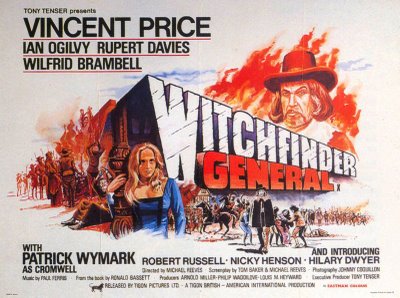
WITCHFINDER GENERAL.
UK, 1968, 85 minutes, Colour.
Vincent Price, Ian Ogilvy, Hilary Dwyer, Rupert Davies, Patrick Wymark, Wilfrid Brambell.
Directed by Michael Reeves.
Witchfinder General is based on Edgar Allen Poe’s story Conqueror Worm. This is a star vehicle for Vincent Price in the UK (although the director, Michael Reeves, wanted Donald Pleasence to play Matthew Hopkins but the American co-financiers insisted on Vincent Price because of his popularity in horror films).
However, Price gives and extraordinarily powerful performance as the loathsome Witchfinder General. The film is set during the English Civil War, the Royalists fighting against the Parliamentary Party for control of England. Exploiters of this situation include such men as Matthew Hopkins who, with his assistant (played by Robert Russell), goes around the countryside exploiting superstitious villagers and accusing women of being witches and executing them. This enables him to get money as well as sexual favours. When he attacks the niece of a priest, her fiancé leaves the army in order to pursue the Witchfinder General and bring him to justice.
Ian Ogilvie (TV’s The Saint) is the pursuer. Hilary Heath is the niece.
The film is strongly atmospheric, rather frighteningly violent in its visual portrayals of the action. It was directed by Michael Reeves who made only four feature films during the period 1964 to 1968: Castle of the Living Dead, Sister of Satan, The Sorcerers and Witchfinder General.
1. This was a Vincent Price horror film. Was it successful?
2. The film also had a serious historical setting, with introductory commentary. Was the film a successful historical film about witch hunting?
3. Was the Civil War atmosphere well presented – e.g. the initial skirmish and Richard's waiting with the horses, the talk of Parliamentary rule, Cromwell's discussion of his mission, the King's escape, the seeking of horses by the army etc? What kind of atmosphere was this? Why one of terror?
4. Was Matthew Hopkins presented as a caricature or as a character? Was he credible? Why did he work with as his assistant? Why did he seek out witches? He spoke of principles and the law; he accepted the magistrate's fees for killing witches; he enjoyed his work; he committed fornication; he had ambitions to be Witchfinder General. How much of a hypocrite was he? Did he believe at all in his mission to find witches?
5. How did the story of Richard, and add a human dimension to the story? Why was the priest denounced? Was right to lure Hopkins on to save her uncle's life? Why did Hopkins discard her?
6. The film opened with an execution. Should the torture of the priest and his hanging, the ordeal by water of others accused of witchcraft, the burning of a woman and the final torture of the heroine. Was this excessive for the film? Why? How necessary was it for the re-creation of the harshness of the times?
7. Did Richard have the right to execute revenge? Were his final killing of Hopkins and his final words justifiable ?
8. How do righteous seekers of evil create terror, suffering and atmospheres of evil?
9. Why do informers collaborate with Witchfinders?
10. Is a film like this entertaining? Is an interest in this aspect of history healthy? Of what interest or benefit is it to us now?